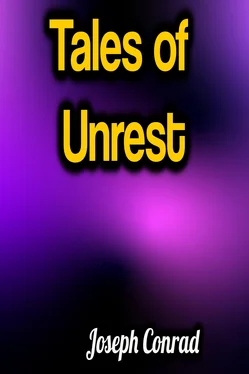Joseph Conrad - Tales of Unrest
Здесь есть возможность читать онлайн «Joseph Conrad - Tales of Unrest» — ознакомительный отрывок электронной книги совершенно бесплатно, а после прочтения отрывка купить полную версию. В некоторых случаях можно слушать аудио, скачать через торрент в формате fb2 и присутствует краткое содержание. Жанр: unrecognised, на английском языке. Описание произведения, (предисловие) а так же отзывы посетителей доступны на портале библиотеки ЛибКат.
- Название:Tales of Unrest
- Автор:
- Жанр:
- Год:неизвестен
- ISBN:нет данных
- Рейтинг книги:5 / 5. Голосов: 1
-
Избранное:Добавить в избранное
- Отзывы:
-
Ваша оценка:
- 100
- 1
- 2
- 3
- 4
- 5
Tales of Unrest: краткое содержание, описание и аннотация
Предлагаем к чтению аннотацию, описание, краткое содержание или предисловие (зависит от того, что написал сам автор книги «Tales of Unrest»). Если вы не нашли необходимую информацию о книге — напишите в комментариях, мы постараемся отыскать её.
Tales of Unrest — читать онлайн ознакомительный отрывок
Ниже представлен текст книги, разбитый по страницам. Система сохранения места последней прочитанной страницы, позволяет с удобством читать онлайн бесплатно книгу «Tales of Unrest», без необходимости каждый раз заново искать на чём Вы остановились. Поставьте закладку, и сможете в любой момент перейти на страницу, на которой закончили чтение.
Интервал:
Закладка:
"We came back to the coast. Our feet were bleeding, our bodies thin. We slept in rags under the shadow of stone enclosures; we prowled, soiled and lean, about the gateways of white men's courtyards. Their hairy dogs barked at us, and their servants shouted from afar, 'Begone!' Low-born wretches, that keep watch over the streets of stone campongs, asked us who we were. We lied, we cringed, we smiled with hate in our hearts, and we kept looking here, looking there for them—for the white man with hair like flame, and for her, for the woman who had broken faith, and therefore must die. We looked. At last in every woman's face I thought I could see hers. We ran swiftly. No! Sometimes Matara would whisper, 'Here is the man,' and we waited, crouching. He came near. It was not the man—those Dutchmen are all alike. We suffered the anguish of deception. In my sleep I saw her face, and was both joyful and sorry . . . . Why? . . . I seemed to hear a whisper near me. I turned swiftly. She was not there! And as we trudged wearily from stone city to stone city I seemed to hear a light footstep near me. A time came when I heard it always, and I was glad. I thought, walking dizzy and weary in sunshine on the hard paths of white men I thought, She is there—with us! . . . Matara was sombre. We were often hungry.
"We sold the carved sheaths of our krisses—the ivory sheaths with golden ferules. We sold the jewelled hilts. But we kept the blades—for them. The blades that never touch but kill—we kept the blades for her. . . . Why? She was always by our side. . . . We starved. We begged. We left Java at last.
"We went West, we went East. We saw many lands, crowds of strange faces, men that live in trees and men who eat their old people. We cut rattans in the forest for a handful of rice, and for a living swept the decks of big ships and heard curses heaped upon our heads. We toiled in villages; we wandered upon the seas with the Bajow people, who have no country. We fought for pay; we hired ourselves to work for Goram men, and were cheated; and under the orders of rough white faces we dived for pearls in barren bays, dotted with black rocks, upon a coast of sand and desolation. And everywhere we watched, we listened, we asked. We asked traders, robbers, white men. We heard jeers, mockery, threats—words of wonder and words of contempt. We never knew rest; we never thought of home, for our work was not done. A year passed, then another. I ceased to count the number of nights, of moons, of years. I watched over Matara. He had my last handful of rice; if there was water enough for one he drank it; I covered him up when he shivered with cold; and when the hot sickness came upon him I sat sleepless through many nights and fanned his face. He was a fierce man, and my friend. He spoke of her with fury in the daytime, with sorrow in the dark; he remembered her in health, in sickness. I said nothing; but I saw her every day—always! At first I saw only her head, as of a woman walking in the low mist on a river bank. Then she sat by our fire. I saw her! I looked at her! She had tender eyes and a ravishing face. I murmured to her in the night. Matara said sleepily sometimes, 'To whom are you talking? Who is there?' I answered quickly, 'No one' . . . It was a lie! She never left me. She shared the warmth of our fire, she sat on my couch of leaves, she swam on the sea to follow me. . . . I saw her! . . . I tell you I saw her long black hair spread behind her upon the moonlit water as she struck out with bare arms by the side of a swift prau. She was beautiful, she was faithful, and in the silence of foreign countries she spoke to me very low in the language of my people. No one saw her; no one heard her; she was mine only! In daylight she moved with a swaying walk before me upon the weary paths; her figure was straight and flexible like the stem of a slender tree; the heels of her feet were round and polished like shells of eggs; with her round arm she made signs. At night she looked into my face. And she was sad! Her eyes were tender and frightened; her voice soft and pleading. Once I murmured to her, 'You shall not die,' and she smiled . . . ever after she smiled! . . . She gave me courage to bear weariness and hardships. Those were times of pain, and she soothed me. We wandered patient in our search. We knew deception, false hopes; we knew captivity, sickness, thirst, misery, despair . . . . Enough! We found them! . . ."
He cried out the last words and paused. His face was impassive, and he kept still like a man in a trance. Hollis sat up quickly, and spread his elbows on the table. Jackson made a brusque movement, and accidentally touched the guitar. A plaintive resonance filled the cabin with confused vibrations and died out slowly. Then Karain began to speak again. The restrained fierceness of his tone seemed to rise like a voice from outside, like a thing unspoken but heard; it filled the cabin and enveloped in its intense and deadened murmur the motionless figure in the chair.
"We were on our way to Atjeh, where there was war; but the vessel ran on a sandbank, and we had to land in Delli. We had earned a little money, and had bought a gun from some Selangore traders; only one gun, which was fired by the spark of a stone; Matara carried it. We landed. Many white men lived there, planting tobacco on conquered plains, and Matara . . . But no matter. He saw him! . . . The Dutchman! . . . At last! . . . We crept and watched. Two nights and a day we watched. He had a house—a big house in a clearing in the midst of his fields; flowers and bushes grew around; there were narrow paths of yellow earth between the cut grass, and thick hedges to keep people out. The third night we came armed, and lay behind a hedge.
"A heavy dew seemed to soak through our flesh and made our very entrails cold. The grass, the twigs, the leaves, covered with drops of water, were gray in the moonlight. Matara, curled up in the grass, shivered in his sleep. My teeth rattled in my head so loud that I was afraid the noise would wake up all the land. Afar, the watchmen of white men's houses struck wooden clappers and hooted in the darkness. And, as every night, I saw her by my side. She smiled no more! . . . The fire of anguish burned in my breast, and she whispered to me with compassion, with pity, softly—as women will; she soothed the pain of my mind; she bent her face over me—the face of a woman who ravishes the hearts and silences the reason of men. She was all mine, and no one could see her—no one of living mankind! Stars shone through her bosom, through her floating hair. I was overcome with regret, with tenderness, with sorrow. Matara slept . . . Had I slept? Matara was shaking me by the shoulder, and the fire of the sun was drying the grass, the bushes, the leaves. It was day. Shreds of white mist hung between the branches of trees.
"Was it night or day? I saw nothing again till I heard Matara breathe quickly where he lay, and then outside the house I saw her. I saw them both. They had come out. She sat on a bench under the wall, and twigs laden with flowers crept high above her head, hung over her hair. She had a box on her lap, and gazed into it, counting the increase of her pearls. The Dutchman stood by looking on; he smiled down at her; his white teeth flashed; the hair on his lip was like two twisted flames. He was big and fat, and joyous, and without fear. Matara tipped fresh priming from the hollow of his palm, scraped the flint with his thumb-nail, and gave the gun to me. To me! I took it . . . O fate!
"He whispered into my ear, lying on his stomach, 'I shall creep close and then amok . . . let her die by my hand. You take aim at the fat swine there. Let him see me strike my shame off the face of the earth—and then . . . you are my friend—kill with a sure shot.' I said nothing; there was no air in my chest—there was no air in the world. Matara had gone suddenly from my side. The grass nodded. Then a bush rustled. She lifted her head.
Читать дальшеИнтервал:
Закладка:
Похожие книги на «Tales of Unrest»
Представляем Вашему вниманию похожие книги на «Tales of Unrest» списком для выбора. Мы отобрали схожую по названию и смыслу литературу в надежде предоставить читателям больше вариантов отыскать новые, интересные, ещё непрочитанные произведения.
Обсуждение, отзывы о книге «Tales of Unrest» и просто собственные мнения читателей. Оставьте ваши комментарии, напишите, что Вы думаете о произведении, его смысле или главных героях. Укажите что конкретно понравилось, а что нет, и почему Вы так считаете.












